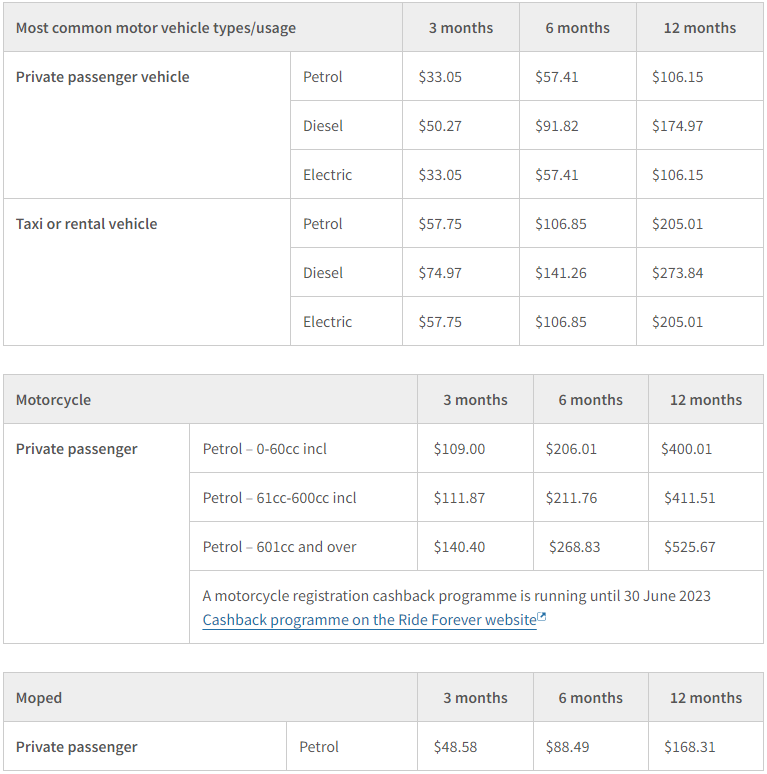Unfair Ride: Challenging the High Cost of Green Commuting on Two Wheels
Article Summary The article highlights the disparity in registration fees between motorcycles and cars, with motorcycles being burdened with higher fees despite their lower emissions and fuel efficiency. The article suggests that the Accident Compensation Corporation (ACC) system, which compensates accident victims, plays a significant role in shaping the fee structure. However, it fails to recognize the environmental benefits of motorcycles and the potential they have in reducing carbon emissions. The article calls for a more balanced and supportive fee structure that reflects the positive contributions of motorcycles to a greener future.
1/8/20243 min read


Unfair Ride: Challenging the High Cost of Green Commuting on Two Wheels
Introduction
In the realm of eco-conscious commuting, the moped and motorcycle community stands as a beacon of sustainable choices. Riders who choose two wheels over four contribute significantly to a greener environment, embracing a lifestyle that is both exhilarating and environmentally responsible. However, the unfair burden of registration fees casts a shadow over their eco-friendly endeavors, raising questions about the true cost of going green.
The Heart of the Two-Wheeler Community
The moped and motorcycle community is not merely a group of commuters; it's a passionate collective bound by the love of riding. The wind in their hair, the hum of engines, and the freedom of the open road encapsulate the essence of their shared enthusiasm. Beyond the thrill, these riders champion a more sustainable mode of transportation, embodying a commitment to reducing their carbon footprint.
Decoding Vehicle Registration Fees
While their commitment to green commuting is commendable, the disparity in registration fees between two-wheelers and four-wheelers is glaring. Let's dissect the numbers – breaking down the registration costs explicitly for motorcycles and mopeds compared to their larger, four-wheeled counterparts. The financial burden on two-wheel vehicle owners is disproportionate, and their concerns over these discrepancies echo through the riding community.
Eco-Conscious Riders Paying the Price
The irony is hard to ignore – riders choosing motorcycles and mopeds for their lower emissions and fuel efficiency are paradoxically burdened with higher registration fees. These eco-conscious individuals are paying a price beyond their environmental footprint, facing a financial hurdle that contradicts the very purpose of their sustainable choices. It's time to shed light on the unjust financial strain imposed on those who opt for a greener mode of transport.
Seeking Answers: Why the Inequality?
Introduction:
As we delve into the intricacies of the registration fee structure, it becomes evident that the ACC (Accident Compensation Corporation) system plays a pivotal role in shaping the financial landscape for motorcycle riders. While there may be valid reasons rooted in the cost of treating injuries sustained by motorcyclists after accidents, it is clear that the fee structure is not solely a financial decision. Surprisingly, the system disproportionately favors petrol-powered cars, neglecting to provide any substantial incentive for the environmentally conscious choice of motorcycles. This oversight raises critical questions about the true motivations behind the fee structure and its impact on efforts to reduce carbon emissions.
The ACC Dilemma:
The rationale behind the registration fee structure gains clarity when examining the ACC system's role in compensating accident victims. The higher risk and cost associated with treating injuries sustained by motorcycle riders in accidents have contributed to the fee disparities. However, this justification fails to address the broader environmental benefits that motorcycles bring to the table. The fee structure, heavily skewed towards petrol-powered cars, fails to acknowledge the potential of motorcycles as a sustainable alternative, perpetuating an imbalance that hinders the broader goal of reducing carbon emissions.
Unmasking the Discrepancies:
While the ACC system might rationalize higher fees for motorcycles based on accident-related costs, it falls short of recognizing the positive environmental impact of choosing two wheels over four. Petrol-powered cars enjoy a disproportionately favorable fee structure, even though motorcycles present a credible solution to lowering carbon emissions. The lack of incentives for adopting motorcycles as a greener alternative contradicts the overarching goal of encouraging sustainable commuting practices.
Shifting Perspectives:
It's imperative to reassess the fee structure with a holistic perspective. Instead of solely focusing on the costs associated with accidents, policymakers should consider the broader environmental implications. Motorcycles can play a crucial role in reducing congestion and lowering carbon emissions, warranting a more balanced and supportive fee structure that reflects their positive contributions to a greener future.
Advocating for Change:
Armed with a comprehensive understanding of the disparities within the ACC system, the motorcycle community can actively advocate for change. By engaging with policymakers, raising awareness about the environmental benefits of motorcycles, and proposing incentives for choosing two wheels, riders can contribute to a fairer and more environmentally conscious registration fee structure. It's time to shift the narrative from a singular focus on accident costs to a more nuanced perspective that embraces the potential of motorcycles in creating a sustainable and eco-friendly transportation landscape.
In conclusion, unraveling the complexities of the registration fee structure reveals a need for a paradigm shift. By acknowledging the environmental advantages of motorcycles and addressing the ACC system's limitations, we can pave the way for a fairer and more equitable fee structure that encourages sustainable commuting choices.
